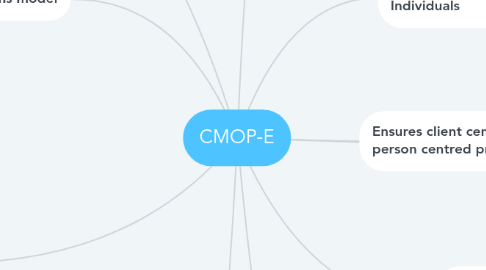
1. Person
1.1. Spiritual
1.1.1. What has meaning to the person
1.1.1.1. Passions
1.1.1.2. Beliefs
1.1.1.3. Values
1.2. Affective
1.2.1. Social and emotional functions
1.2.1.1. Verbal skills
1.2.1.2. Empathy
1.2.1.3. Eye contact
1.3. Cognitive
1.3.1. Mental Functions
1.3.1.1. Memory
1.3.1.2. Learning
1.3.1.3. Time
1.3.1.4. Insight
1.4. Physical
1.4.1. Sensory/Motor and Sensory motor skills
1.4.1.1. Strength
1.4.1.2. Posture
1.4.1.3. Mobility
1.4.1.4. Balance
2. Occupation
2.1. Productivity
2.1.1. Work/employment
2.1.2. Volunteer work
2.2. Habits
2.3. Self Care
2.3.1. Dressing
2.3.2. Hygeine
2.4. Routines
2.5. Leisure
2.5.1. Sports
2.5.2. Social life
2.6. Roles
3. Engagement
3.1. The meaning a person derives from participating in an occupation
4. A systems model
5. Environment
5.1. Physical
5.1.1. Natural environment
5.1.2. Buildings
5.1.3. Equipment
5.1.4. Accessibility
5.1.5. Climate
5.1.6. Workplace/Home
5.2. Cultural
5.2.1. Beliefs/Values
5.2.2. Attitudes
5.2.3. Traditions
5.2.4. Workplace culture
5.2.5. Therapy culture
5.3. Social
5.3.1. Friends
5.3.2. Family
5.3.3. Colleagues
5.3.4. Therapists
5.4. Institutional
5.4.1. Government legislation
5.4.2. Education
5.4.3. Funding
5.4.4. Therapy practice regualtons

